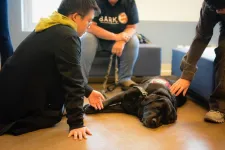(Press-News.org) The largest brain autopsy study of women who had experienced intimate partner violence reveals substantial vascular and white matter damage in the brain, but no evidence of chronic traumatic encephalopathy (CTE), the neurodegenerative disease recognized among male contact sports athletes who sustain repeated head trauma.
The international collaboration, led by a team from the Brain Injury Research Center of Mount Sinai in collaboration with the New York City Office of the Chief Medical Examiner, appears in the most recent issue of Acta Neuropathologica.
Importantly, the study also revealed substantial medical comorbidity, including cardiovascular and cerebrovascular disease, suggesting a need to consider a broad scope of pathology that underlies intimate partner violence-related brain injury, as well as the medical and psychiatric comorbidities that contribute to brain health during life.
Despite how common intimate partner violence is—it affects one in three women at some point in their lives—remarkably little is known about the neuropathology of partner violence. The long-term consequences of traumatic brain injury include the risk of neurodegenerative disease, and in the popular press and even in scientific discussions, there is an assumption that repeated head injuries sustained in the context of intimate partner violence are comparable to those sustained by male contact sports athletes.
“Because our team has been conducting research and clinical care with survivors of partner violence for years, we strongly suspected that the neuropathology of brain injury may be far more complex than assumed,” said Kristen Dams-O’Connor, PhD, Director of the Brain Injury Research Center of Mount Sinai and lead author of the paper. “Through our unique collaboration with the Office of the Chief Medical Examiner here in New York and international colleagues, we were able to shed light on this group that has been nearly absent from the medical literature.”
The collaboration between the Brain Injury Research Center and the Office of the Chief Medical Examiner dates from 2019, when the two entities solidified an unprecedented academic collaboration with the shared goal of identifying decedents with a history of traumatic brain injury for inclusion in the Late Effects of TBI (LETBI) brain donor program.
The clinical research team invited families of the decedents to participate in an interview so the team could learn more about the deceased’s health, brain trauma history, and any symptoms of clinical decline the relatives may have observed during life. The postmortem protocol of the LETBI study includes ex vivo imaging, in which the whole brain specimen is scanned at high resolution. This allows researchers to identify lesions that are invisible to the human eye and that would be missed in a standard brain autopsy, permitting an examination of unparalleled comprehensiveness.
For the prospective case series, 14 brains were obtained over two years from women with documented intimate partner violence (ages 20s-late 70s; median, 30s) and complex histories, including prior traumatic brain injury; nonfatal strangulation; cerebrovascular, neurological, and/or psychiatric conditions; and epilepsy. At autopsy, all had old and/or recent traumatic brain injury stigmata (physical marks seen in the brain that are characteristic of the condition). Substantial vascular and white matter pathology was seen in some. Evidence of cerebrovascular disease from lacunes (small cystic cavities in the brain that usually result from an ischemic infarction and much more rarely from a small, deep cerebral hemorrhage) and/or from chronic infarcts (localized areas of dead tissue resulting from failure of blood supply). Alzheimer’s disease neuropathologic change was present only in the oldest case in the series (in the 70-79 age range), and no CTE neuropathologic change was identified in any.
Findings from the initial prospective case series prompted similar exploration of an expanded case series of 70 archival intimate partner violence cases (ages late teen to late 80s; median 30s) accrued from multiple international institutions. In this archival series, the research team again found evidence of vascular and white matter pathologies. Only limited neurodegenerative proteinopathies were encountered in the oldest subjects, with none meeting the consensus criteria for CTE neuropathologic change.
“We were astounded by the burden of health comorbidity carried by the women in this series. Approximately half had epilepsy, and chronic diseases such as diabetes, hypertension, substance use, and HIV were common,” said Dr. Dams-O’Connor. “The findings clearly indicate that we should be casting a much wider net when it comes to characterizing the neuropathology of partner violence-related brain injury and post-traumatic neurodegeneration.”
“The consequences for intimate partner violence are enormous both on an individual and societal level, and it’s more common than most people realize,” she added. “Our research suggests that it is a frequently unmeasured and under-recognized contributor to the brain health decline experienced by many survivors.”
Rebecca Folkerth, MD, Neuropathologist at the New York City Office of the Chief Medical Examiner, Clinical Professor of Forensic Medicine at NYU Grossman School of Medicine, and senior author of the paper, emphasizes that “without close collaboration between forensic centers, where violent deaths are analyzed for medico-legal purposes, and clinical research collaborators such as those at the Brain Injury Research Center of Mount Sinai, advances in the field of intimate partner violence will remain highly constrained. The only way toward understanding the associated brain injuries at a cellular level is through coordinated, intensive examination directly in the brains of affected individuals. We are so grateful for this initial opportunity, and hope to expand it while using and sharing what we have learned.”
The researchers advise anyone who encounters someone with a history of intimate partner violence to be aware that the individual may have neurological injury that affects their brain health and function. The work of researchers and clinicians at Mount Sinai’s Brain Injury Research Center has consistently demonstrated that people living with brain injury may not able to benefit from standard interventions that are not tailored to address their deficits. They may require difference accommodations, more reminders, and more support to benefit from available assistance.
“If someone with a brain injury misses an appointment, it may not be because they’re ungrateful for the help or they don’t care about the service being offered. If they lose their temper, it may be a manifestation of neurobehavioral dysregulation attributable to the traumatic brain injury. If they remain in a violent relationship, it may be that they don’t have the cognitive and executive function skills, or resources, required to orchestrate a safe and successful path to safety,” explained Dr. Dams-O’Connor. “This is not something the survivor should be blamed for.”
The results of this case series represent an unprecedented advancement in the understanding of partner violence-related brain injury, and the investigators believe there is a message of hope in their findings. Vascular contributors to cognitive impairment and decline may be treatable in some cases. Given the high burden of vascular brain injury, together with the extensive disease comorbidity observed in this cohort, it is possible that some symptoms experienced by people living with partner violence-related brain injury may be treatable, or even preventable. Domestic violence often goes unreported, and survivors may struggle to access even basic health care. Systematic screening for intimate partner violence can connect survivors to available resources—and possibly could have even saved the lives of the young women in this study.
About the Mount Sinai Health System
Mount Sinai Health System is one of the largest academic medical systems in the New York metro area, with more than 43,000 employees working across eight hospitals, more than 400 outpatient practices, more than 300 labs, a school of nursing, and a leading school of medicine and graduate education. Mount Sinai advances health for all people, everywhere, by taking on the most complex health care challenges of our time—discovering and applying new scientific learning and knowledge; developing safer, more effective treatments; educating the next generation of medical leaders and innovators; and supporting local communities by delivering high-quality care to all who need it.
Through the integration of its hospitals, labs, and schools, Mount Sinai offers comprehensive health care solutions from birth through geriatrics, leveraging innovative approaches such as artificial intelligence and informatics while keeping patients’ medical and emotional needs at the center of all treatment. The Health System includes approximately 7,400 primary and specialty care physicians; 13 joint-venture outpatient surgery centers throughout the five boroughs of New York City, Westchester, Long Island, and Florida; and more than 30 affiliated community health centers. Hospitals within the System are consistently ranked by Newsweek’s® “The World’s Best Smart Hospitals” and by U.S. News & World Report's® “Best Hospitals” and “Best Children’s Hospitals.” The Mount Sinai Hospital is on the U.S. News & World Report® “Best Hospitals” Honor Roll for 2023-2024.
END
Largest brain autopsy study of female intimate partner violence decedents reveals brain injury pathology unlike that seen among male contact sports athletes
2023-10-30
ELSE PRESS RELEASES FROM THIS DATE:
Soy expansion in Brazil linked to increase in childhood leukemia deaths
2023-10-30
URBANA, Ill. – Over the past decades, Brazil has become the world’s leading soybean producer, as well as the leading consumer of pesticides. Despite concerns about potential public health consequences, little is known about the effects of pesticide exposure in the general population. A new study from the University of Illinois Urbana-Champaign in collaboration with the University of Denver and University of Wisconsin-Madison looks at how soy expansion and increased pesticide use in Brazil’s Cerrado and Amazon biomes correlate with increased childhood cancer mortality.
“The Brazilian Amazon region is undergoing a transition ...
Amazon deforestation linked to long distance climate warming
2023-10-30
Deforestation in the Amazon causes land surfaces up to 100 kilometres away to get warmer, according to a new study.
The research, by a team of British and Brazilian scientists, led by Dr Edward Butt at the University of Leeds, suggests that tropical forests play a critical role in cooling the land surface - and that effect can play out over considerable distances.
It is known that when tropical forests are cleared, the climate in the immediate vicinity gets warmer.
In this latest study, the researchers wanted to know if deforestation in the Amazon was resulting in climate warming further afield, and the study examined the impact of forest loss on sites up to ...
NYU Abu Dhabi researchers reveal how common desert shrub efficiently harvests water from the air
2023-10-30
Abu Dhabi, UAE, October 2023: A team of scientists, led by Post-Doctoral Associate Marieh Al-Handawi and Professor of Chemistry Panče Naumov from NYU Abu Dhabi’s Smart Materials Lab and NYU Abu Dhabi Institute’s Center for Smart Engineering Materials (CSEM) has revealed the mechanism a desert plant native to the United Arab Emirates uses to capture moisture from the desert air in order to survive. The identification of this unique mechanism, in which the plant excretes salts to extract and condense water onto the surface of its leaves, has the potential to inspire ...
Royal Canadian Institute for Science recognizes the unsung heroes of science communication
2023-10-30
The Royal Canadian Institute for Science (RCIScience) awards the 2023 Sandford Fleming Medal for Excellence in Science Communication to independent science writer Terry Collins and the William Edmond Logan Award to the team behind CBC Radio's national weekly science program, Quirks & Quarks.
A knowledge translator for over 27 years, Terry Collins' reporting has been picked up by journalists in Canada and worldwide, awakening public interest in and deepening understanding of diverse sciences, fostering political will and mobilizing resources for change.
Nominator Dr. Peter A. Singer, former Special Advisor to the Director-General of the World Health Organization, ...
Institute for Systems Biology and NED Biosystems announce collaboration to show how cancer’s onset may be reversed
2023-10-30
SEATTLE – Leroy Hood, MD, PhD, co-founder of Seattle’s Institute for Systems Biology (ISB) and a pioneer in systems biology, and Rebecca Lambert, founder and CEO of NED Biosystems, Inc. (NED), a public benefit corporation that is developing the first oral “systems treatment” for cancer, have entered into a memorandum of understanding to collaborate on a clinical trial to show how cancer’s onset may be reversed.
NED’s cancer treatment, NED-170, takes a systems approach that combines repurposed, oral agents that are well documented in humans to affect critical cancer disease-driver processes at doses that lack customary toxicity and side effects.
“A ...
Women with physical disabilities are less likely to be screened for cervical cancer than women without disabilities
2023-10-30
Around 11,500 new cases of cervical cancer are diagnosed each year in the United States, according to the Centers for Disease Control (CDC). The CDC tracks cervical cancer rates by age, race, and ethnicity, but not by disability type. A 2022 study found that women with disabilities may encounter multiple social and economic barriers to accessing reproductive health care, and a lack of timely access to cervical cancer screening may lead to delayed diagnosis and treatment for cervical cancer.
According to research by Mason PhD in Public Health ...
Department of Energy announces $11.4 million for research on quantum information science for fusion energy sciences
2023-10-30
WASHINGTON, D.C. - Today, the U.S. Department of Energy (DOE) announced $11.4 million for six projects in quantum information science (QIS) with relevance to fusion and plasma science.
The Fusion Energy Sciences (FES) program supports fundamental research to expand the understanding of matter at very high temperatures and densities and to build the scientific foundation needed to develop a fusion energy source. The QIS portfolio within FES supports research opportunities outlined in the 2018 Fusion Energy Sciences Roundtable on Quantum Information Science report. It includes science and technology thrusts where QIS might have a transformative impact on FES ...
RIT scientists receive grant to expand work on a sign language lexicon for chemistry
2023-10-30
A team of scientists at Rochester Institute of Technology will expand its work after receiving a large grant from the National Science Foundation to make chemistry more accessible for students who rely on American Sign Language interpreters in class.
Christina Goudreau Collison, professor in the School of Chemistry and Materials Science; Jennifer Swartzenberg, senior lecturer in the National Technical Institute for the Deaf’s Department of Science and Mathematics; Lea Michel, professor in the School of Chemistry and Materials Science; and Pepsi Holmquist, visiting assistant professor in NTID’s Department of Science and Mathematics, have been awarded nearly $380,000 ...
Canine cuddles can comfort equally across all genders
2023-10-30
While there are a number of studies demonstrating that dog therapy programs can improve a person’s social and emotional wellbeing, many typically have a disproportionate number of female participants.
Recent research led by Dr. John-Tyler Binfet, an Associate Professor in UBC Okanagan’s School of Education and Director of Building Academic Retention through K9s (BARK), evaluated if there are gender differences in wellbeing by setting up separate dog therapy sessions for those who identified as female, male and gender diverse participants.
Dr. Binfet has conducted numerous studies on the benefits of canine therapy, but to his knowledge, ...
Protein eIF4A emerges as a potential Achilles’ heel for triple-negative breast cancer
2023-10-30
Improving treatments for triple-negative breast cancer (TNBC), an aggressive tumor with very poor prognosis and limited therapeutic targets, has been challenging. Responding to this need for better treatments, researchers at Baylor College of Medicine and collaborating institutions have investigated potential vulnerabilities in TNBC that could lead to novel therapies and improved outcomes for this devastating condition.
The team reports in The Journal of Clinical Investigation that in diverse TNBC animal models, targeting protein eIF4A with the ...




